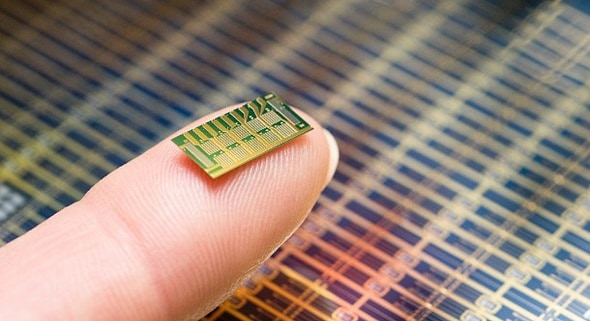
Contraceptive microchip tipped to revolutionise birth control
pharmafile | July 14, 2014 | News story | Medical Communications, Sales and Marketing | Bill Gates, MIT, contraceptive, device, implant, microchips
IT start-up company MicroCHIPS is developing a radical new contraceptive in the form of a microchip that is implanted under the skin – and can be operated wirelessly by remote control.
The US firm which has links to the Massachusetts Institute of Technology (MIT) is backed by the Bill and Melinda Gates Foundation, and should it pass certain safety tests could be on the market as early as 2018.
On its development MicroCHIPS president Robert Farra says: “The idea of using a thin membrane like an electric fuse was the most challenging and the most creative problem we had to solve.”
The device is designed to be implanted under the skin of the buttocks, upper arm, or abdomen. It dispenses 30 micrograms a day of levonorgestrel, a hormone already used in several kinds of contraceptives.
To conceive, women turn off the implant with a remote control: another click of the remote restarts it. The makers say that after 16 years it could be removed, and doctors could also adjust dosages remotely. This is a first as currently no hormonal birth control lasts over five years.
Farra tells the BBC that: “The ability to turn the device on and off provides a certain convenience factor for those who are planning their family.”
The chip is intended to give a long-term fix to birth control and would drastically reduce trips to clinics, along with procedures to remove contraceptive devices. The two of which can pose as a barrier for women in developing countries where they don’t have easy access to medical centers.
MicroCHIPS says that the implant could be available by 2018 if clinical trials launching next year in the US are successful, and adds that the device will be ‘competitively priced’.
The original idea for the device came about two years ago in a visit by Bill Gates and his colleagues to Robert Langer’s MIT lab. They asked Langer if it were feasible to create birth control that a woman could turn on and off and use for many years.
Langer believed the controlled release microchip technology he invented with colleagues in the 1990s and licensed to MicroCHIPS might indeed offer a solution.
More work remains before MicroCHIPS files an application with the Food and Drug Administration.
Brett Wells
Related Content

MIT-developed algorithm seeks to accelerate drug approvals during COVID-19 pandemic
A study emerging from the Massachusetts Institute of Technology (MIT) and published in the Harvard …

New antibiotic discovered by AI for the first time
MIT researchers have identified a new antibiotic compound using a machine-learning algorithm. In the laboratory …

Signal boosting implant allows patients with Parkinson’s to walk
Patients with Parkinson’s have been able to walk after receiving electrical stimulation to their spines. …








